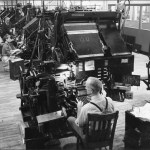Media
What are the relative strengths and weaknesses of long-form, slow-bake, "mainstream" journalism and the idiom we call the blogosphere? As per Bora, the meaning of these terms are shifting as we speak. Last night, using my recent story and blogging on PTSD as a point of focus, I put in my latest two cents on this subject at my talk -- actually a long conversation with host and audience -- at the NYU Science, Health and Environmental Program's "Inside-Out" lecture series.
This was a crowd of writers, journalism profs, and journalism students, and I think we were all surprised at how many…
After writing a global warming denialist piece for his Washington Post column back in February that was totally eviscerated for running roughshod over anything actually resembling the truth, it looks like George Will is at it again. Fortunately, Carl Zimmer is already on the case:
Today, George Will is back on the subject of global warming. The occassion for his column is the alleged uselessness of energy-efficient light bulbs. The column is basically a cut-and-paste job on a recent New York Times article on the bulbs-the same newspaper that Will claimed in an earlier column is "a trumpet…
Tufts University is the latest institution to step in the Conflict of Interest mess and come out with shoes that smell. The University had organized a conference on conflict of interest in medicine and research, with Iowa's Republican Senator Charles Grassley as the keynoter. Grassley has been an indefatigable crusader against instances of fraud and abuse against the federal government, and is a principal author and defender of the Federal False Claims Act, which allows whistleblowers to share in the recovery of fraudulently obtained monies (for an excellent account, see Henry Scammell's…
This is insane: YouTube has become an overzealous nanny, protecting kooks from offense, now banning the eminently respectable JREF.
There's only one way to respond to this, in addition to writing letters of protest: I'm going to have to stop using YouTube at all. I'll be posting no more YouTube videos until the JREF is fully reinstated, and even then I'll be looking for alternatives (XTube? RedTube? No, I know…GodTube! (seriously, don't go to any of those, they're awful)). YouTube is ubiquitous, but it's a common technology, there are lots of sites that can implement it, and there's no need…
You know I have been following the "death of newspapers" debate, as well as "bloggers vs. journalists" debate, and "do we need science reporters" debate for a long time now. What I have found - and it is frustrating to watch - is that different people use different definitions for the same set of words and phrases. "News", "reporting", "media", "press", "journalism", "Web", "Internet", "blog", "citizen journalist", "newspapers", "communication", etc. are defined differently by different people. Usually they do not explicitly define the terms, but it is possible to grasp their definition from…
From The New York Times science page:
Click here for a larger image and here for context.
Compact fluorescent lamps (CFLs), or "energy saving light bulbs", are much more energy efficient than conventional light bulbs, and they have a significantly longer lifetime. On top of that, replacing your conventional bulbs with CFLs won't just save energy, but will also save you money. Most importantly, this is one small action that we can all contribute to the fight against global warming.
However, yesterday's New York Times included an article by Leora Broydo Vestel entitled "Do New Bulbs Save Energy if They Don't Work", which hypes up concerns about compact fluorescent lamps (CFLs) not…
Kim is excited:
It's official!
The Medbloggers are now a part of BlogWorld/New Media Expo 09!
Thanks to sponsorship from Johnson & Johnson and MedPage Today, the "Medlblogger Meet-Up" is now a reality.
But it is so much more than "just" a meet-up.
A full day of topics, voted on by the medical bloggers themselves, will be presented, with plenty of time to mix and mingle with our blogging colleagues.
Blog World/New Media Expo 09 will take place at the Las Vegas Convention Center the weekend of October 15-17.
New blogger, established blogger, podcaster or internet broadcaster, there is a…
From Jay Rosen:
As the crisis in newspaper journalism grinds on, people watching it are trying to explain how we got here, and what we’re losing as part of the newspaper economy crashes. Some are trying to imagine a new news system. I try to follow this action, and have been sending around the best of these pieces via my Twitter feed. It’s part of my experiment in mindcasting, which you can read about here.
I've not read all of it, but there's some good stuff in there.
I first posted this on June 24, 2004 on the www.jregrassroots.org forums, then republished on August 23, 2004 on Science And Politics, then a couple of times on this blog.
Why did I decide to re-post it today?
Because I have been thinking and reading about the current state and potential future of journalism, including science journalism, and writing (still in my head) a post about it. So, I am forcing myself to go through my evolution of thinking about the topic, digging through my categories on the Media, Science Reporting, Blogging, Open Science, onlin Technology, etc. and this essay was…
Today, in their segment called "Seeing Eye Horse Shocks Store Patrons," Good Morning America featured a woman riding her full sized "Seeing Eye horse" through the grocery store (pictured left). In doing so, it made one of the most common media mistakes: focusing on the quirk factor (woman riding horse in store!) at the expense of the issues involved. The result is a classic oversimplification of a complex story that's pretty misleading about the use of horses as service animals: Most non-canine service animal
users are not, in fact, people who ride horses through stores. …
This week, Carrboro Citizen celebrated its second anniversary. I explained in detail before their model and why I think this is the future of journalism. Now, the Editor, Kirk Ross, gives us the inside story:
You can't be in this business without wondering how much wilder the ride can get. I've written about this before, so I'll spare you the wind up. The talking points are that not every newspaper is in trouble and that most that are hurting are chain-owned metro dailies burdened by debt brought on by a mergers-and-acquisition craze reminiscent of the Dutch tulip bubble.
-----------------
To…
This is an amusing tale of creationist hypocrisy. Ken Ham is complaining that one of his staff members was "ambushed", because he wasn't given a solo interview, but had to share the discussion with a critic (meanwhile, Ham has no compunction about "ambushing", in the same sense, scientific discussions). What I found most interesting, though, were Ken Ham's complaints about the BBC.
This past week, Dr. Jason Lisle--our astrophysicist*—was invited to be on a BBC radio program out of Southampton , England (where I spoke a couple of weeks ago). We were told that it was just going to be an "…
Linotype operators work in the composing room at the P-I building at 6th and Wall Street in December, 1948. (Seattle Post-Intelligencer photo)
To follow up on my post about science journalism and blogs, a few reading links dealing with science in society, journalism, and the transformation of media.
First, Peter Dizikes revisits C.P. Snow's ubiquitous "two cultures", fifty years later:
"The Two Cultures" actually embodies one of the deepest tensions in our ideas about progress. Snow, too, wants to believe the sheer force of science cannot be restrained, that it will change the world -- for…
We've been through this before. When New Scientist ran their misleading "Darwin was wrong" cover, we hammered at them and pointed out that they were doing us no favors — they were giving ammunition to creationists who would never read the contents, but would wave that cover at school board meetings. And they did. We chastised the editor, Roger Highfield, and we had the impression that he was penitent, but it turns out we were completely wrong.
New Scientist is now using that same cover again in their promotional material to flog magazines. Yes, that is their business, to sell magazines…but…
Today Bora, Abel, and I visited Duke's Sanford Institute on Public Policy for the second year in a row to discuss the coverage of science, health, and policy. We chatted with a group of undergraduates about the evolution of science blogs, the emergence of blogging networks, the role of science blogs vs the MSM, and where open-access fits in. Our beloved scibling Isis even made a guest appearance via gchat!
We had a lot of fun and special thanks to GenomeBoy for inviting us to explore ideas with his terrific class! The other 'Beacons of the Bloggerati' had cameras, so photo to come. …
Illustration by David Parkins, Nature
Today, Nature released a news feature by Geoff Brumfiel on the downturn in mainstream science media. We've all known that this is happening; the alarms become impossible to ignore when Peter Dysktra and his team at CNN lost their jobs last year. For mainstream outlets like CNN or the Boston Globe to cut science may seem appalling - but in an unforgiving economic climate which has already triggered the collapse of major newspapers like the Seattle Post-Intelligencer, such cuts are logical, because science reporting isn't a big money-maker. The question…
You know I am very interested in the way the Web is changing the workplace, in many instances eliminating the need for having a physical office.
Michael Rosenblum appears to feel the same way about it:
Two years ago, we began a very interesting experiment with a major cable provider.
We built and ran (and continue to run) a hyper-local TV station which is probably the most cost-effective in the country. It's a model for others.
Now, after two years, we are going to start our second one.
When we sat down to do the budgets, the first thing we cut out was the office.
We had an office for the…
Dave Winer called up Jay Rosen and interviewed him about the potential of twitter-like platforms to become a news/journalistic medium. Listen to the podcast here. Join the discussion here.
Related: What does twitter mean for breaking news stories?
On Thursday morning (US Pacific Time), March 12, 2009, a piece of debris came close enough the International Space Station to require the astronauts to take refuge in the Soyez module, just in case there was a collision. In the end, the debris passed by without incident.
I experienced this event almost entirely through twitter. This essay is to…
This is ridiculous. New Scientist abruptly yanked an article from their web site because they "received a complaint about the contents of the story." Hmmm. Makes a fellow really want to see what horror was wreaked in the censored item: Pornography? Personal defamation? Embarrassing revelation? Alas, it's nothing quite so juicy. You can find a copy of the pulled article (isn't it sweet how the web makes it almost impossible to actually make history disappear?): it's all about how to spot a religious agenda in so-called science books that the creationists like to peddle — basic stuff like code…




